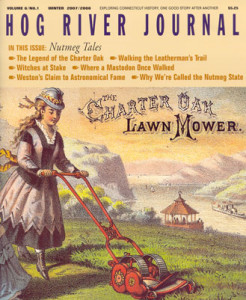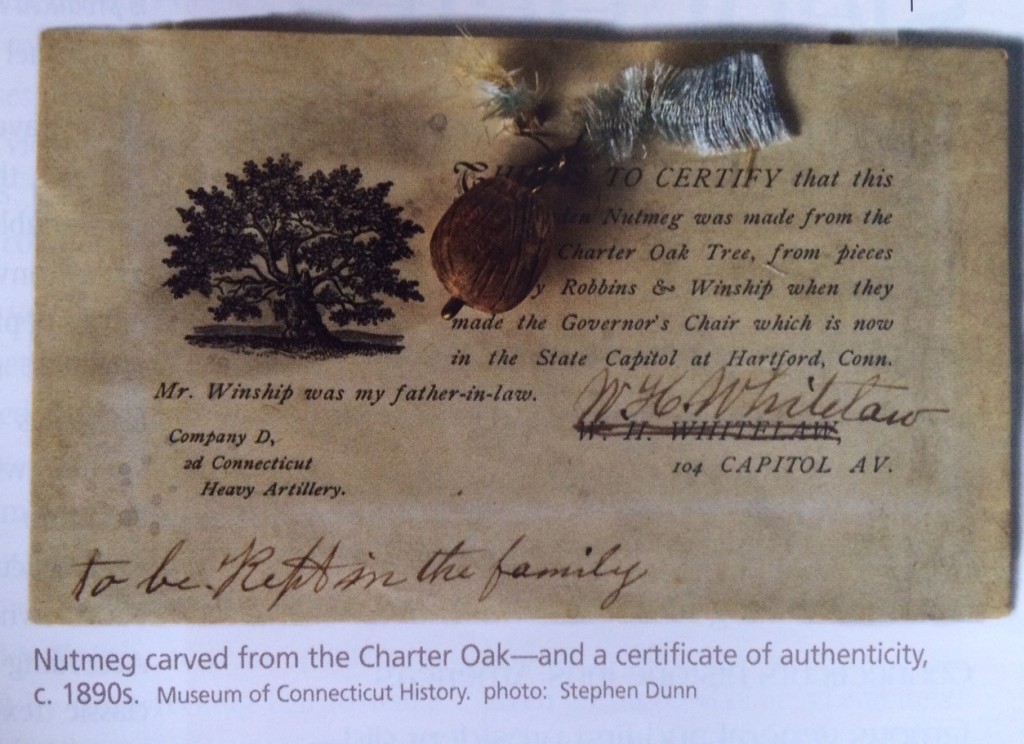By Walter W. Woodward
©Connecticut Explored Winter 2007 Volume 6 Number 1
Subscribe/Buy the Issue!
State historian Walt Woodward tells us the story behind the state’s association with nutmeg and sheds some light on an unusual object in the collection of the Museum of Connecticut History: a wooden nutmeg carved from a piece of the famous Charter Oak.
 Of all the nicknames people have used to describe the essential
character
of
our
state,
none
has
a
more colorful—or
controversial—history
than
the
“Nutmeg
State.” That
slogan
was
born
in
the
early
days
of
the American
republic,
and
it
captured
in
two
words
much
of
what
was
both
best
and
worst
about
the
newly emerging
Connecticut
Yankee.
Of all the nicknames people have used to describe the essential
character
of
our
state,
none
has
a
more colorful—or
controversial—history
than
the
“Nutmeg
State.” That
slogan
was
born
in
the
early
days
of
the American
republic,
and
it
captured
in
two
words
much
of
what
was
both
best
and
worst
about
the
newly emerging
Connecticut
Yankee.
 During
the
years
surrounding
1800,
Connecticut
sea
captains
actively
traded
Wethersfield
onions—used
largely
to
feed
Caribbean
slaves—for
much‐sought‐after
nutmeg,
a
spice
grown
only
on
the
West
Indian
island
of
Grenada
and
in
the
Mollucas
islands
of
Indonesia.
Also
during
this
time,
young
Connecticut
men
ventured
in
ever‐increasing
numbers
to
the
American
South
and
Midwest
to
peddle
the
clocks,
buttons,
needles,
and
other
sundries
being
produced
by
a
host
of
small,
new
Connecticut
manufactories.
During
the
years
surrounding
1800,
Connecticut
sea
captains
actively
traded
Wethersfield
onions—used
largely
to
feed
Caribbean
slaves—for
much‐sought‐after
nutmeg,
a
spice
grown
only
on
the
West
Indian
island
of
Grenada
and
in
the
Mollucas
islands
of
Indonesia.
Also
during
this
time,
young
Connecticut
men
ventured
in
ever‐increasing
numbers
to
the
American
South
and
Midwest
to
peddle
the
clocks,
buttons,
needles,
and
other
sundries
being
produced
by
a
host
of
small,
new
Connecticut
manufactories.
These Yankee peddlers loved having the hard‐shelled nutmegs—durable, light, and profitable—among their goods. They were highly desired and always easy to sell. So easy that, so the story goes, some of the craftier—and less ethical—of these Connecticut lads took to mixing wooden nutmegs in with the real ones, simultaneously increasing both their profits and their “nutmeg” supply. They, of course, counted on the fact that the purchaser wouldn’t discover the difference until the trader himself was back in the Land of Steady Habits (or was that the Provision State?). As a result of these and similar trickster‐like practices, Connecticut Yankees’ reputation for clever‐but‐not‐fully‐principled trading spread widely and quickly, and the homeland of these likeable but shrewd hucksters became known as “The Nutmeg State.”
Just as their forefathers had done when they adopted as their own the song “Yankee Doodle”—a tune originally intended to ridicule Yankees for being crude rustics—Connecticans took to “Nutmeg State” the way “snake oil” took to “salesman.” At an early and quite formal dinner gathering of the Connecticut Historical Society, one of the dignitaries—following a numerous and extended series of toasts preceding his own—offered this salute to the assembled guests, “To the Nutmeg State,” he said, lifting his glass yet again. “Where shall we find a grater?”
Throughout the 19th century, despite the sobriquet’s pejorative connotations, most Connecticans remained pleased with their reputation for cleverness, and it was (and still in some circles is) common for men to wear a wooden nutmeg in their jacket lapels, identifying them as Connecticans. Such approbation was not universal, though, by any means. On several occasions, and especially in 1903, when it endorsed Emily G. Holcombe’s efforts to officially name Connecticut “The Constitution State,” The Hartford Courant urged citizens to reject the old nickname. “Do not yourself, and do not let others in your presence,” it exhorted, “ allude to Connecticut as the ‘Nutmeg State.’” Continuing to use the phrase, they opined, was “an insult which we give ourselves.” One hundred years later, Connecticans still, though with perhaps a bit less frequency, think of themselves as Nutmeggers, preferring, perhaps, a little spice to a lot of propriety.
